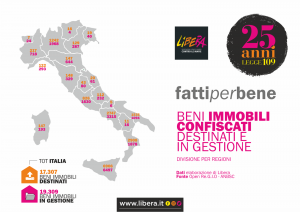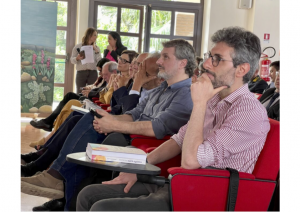The challenge of the CARES project, winner of a cascade call in the PNRR area
The CARES (Confiscated Assets Reuse through Entrepreneurial Startups) project is a research initiative aimed at unlocking the potential of assets seized from mafia organizations for social and economic
development. Funded under the ambitious “GRINS – GROWING RESILIENT INCLUSIVE AND SUSTAINABLE” initiative with a budget of €160K, the project spans from March 2024 to August 2025 and is supported by the European Union’s NextGenerationEU program.

“CARES addresses a critical challenge in asset management post-confiscation”- explains Pierpaolo Parrotta, the project coordinator for the University of Siena – “how to efficiently transform properties that have historically been under the control of organized crime into valuable resources that benefit local communities. With thousands of properties across Italy awaiting a new purpose, CARES proposes a systematic approach to repurpose these assets through entrepreneurship and rigorous scientific research”.
The University of Siena’s research team, comprised of Marco Stimolo and Alessandro Stringhi, in collaboration with Giovanni Immordino from University of Naples “Federico II”, Marianna Marino from SKEMA Business School, Fortuna Casoria from Burgundy Business School, and Valeria Cavotta from Zicklin School of Business, is dedicated to pioneering a methodological framework that integrates qualitative and quantitative research. This framework aims to identify best practices in asset management, with a focus on enhancing the managerial skills and competencies that are crucial in this unique field.

“Thanks to Libera‘s ongoing efforts to map organizations managing seized assets, a comprehensive national survey serves as the cornerstone of the project” – Parrotta emphasizes. “This survey is designed to gather detailed data on the current management strategies and outcomes of confiscated properties. Such data will be crucial in identifying and addressing gaps and inefficiencies in existing practices”.
“A comprehensive national survey forms the backbone of the project – Parrotta highlights – aiming to collect detailed data on the current management strategies and outcomes associated with confiscated properties. This data will be pivotal in identifying gaps and inefficiencies in current practices”.
Building on the survey data, CARES will employ randomized experiments to empirically test the effectiveness of identified best practices. These experiments will involve a treatment group and a control group, providing evidence on the impact of specific managerial training and interventions designed for the unique challenges of managing confiscated assets. By involving a randomly selected group of entrepreneurs in an intensive training program, and comparing their performance against a control group, CARES will evaluate the impact of focused entrepreneurial training on the effective management of seized assets.
“The scientific rigor of CARES – Parrotta adds – is further emphasized through its commitment to creating practical tools and frameworks based on research findings. The project aims to develop a theoretical
framework that can guide both policy-making and on-ground asset management, enhancing the capabilities of organizations involved in these processes”.
The expected outputs of the CARES project are multi-faceted: detailed, publicly accessible dataset on asset management practices; evidence-based recommendations for policy and practice, disseminated through policy briefs and academic publications; practical training modules and management tools for entrepreneurs and organizations involved in managing seized assets.

“Dissemination of research findings is a critical component of CARES – Parrotta says – with planned activities including workshops, seminars, and conferences aimed at stakeholders across academia, industry, and government. This ensures that the project not only contributes to the academic understanding of confiscated asset management but also influences real-world practices”.
“CARES – Parrotta concludes – is set to provide significant insights into the management of confiscated properties, with the dual aim of enhancing academic knowledge and improving the socioeconomic conditions of communities affected by organized crime”.
For further details or collaboration inquiries, please contact the project coordinator Pierpaolo Parrotta, Department of Economics and Statistics, at pierpaolo.parrotta@unisi.it.

